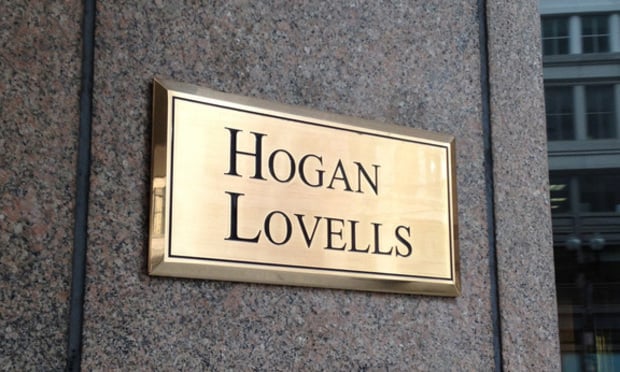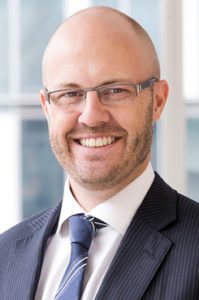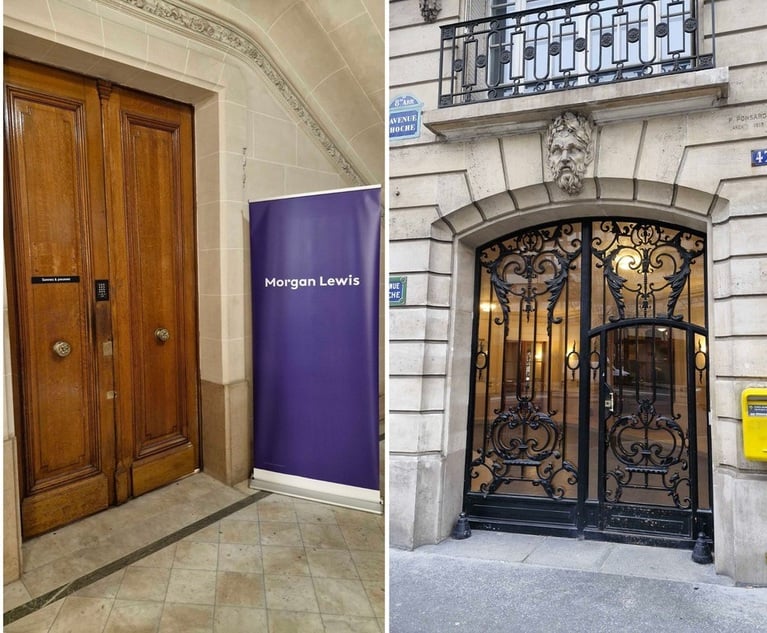Hogan Lovells Australia Plans to Double in Size in Next Three Years
Australia managing partner Scott Harris said the firm hopes to have about 15 partners across its Australia offices.
July 18, 2019 at 01:53 PM
5 minute read
 Hogan Lovells. Photo: Diego M. Radzinschi/ALM.
Hogan Lovells. Photo: Diego M. Radzinschi/ALM.
Hogan Lovells is planning to more than double its Australian partner numbers in the next three years, on the back of more work from global clients, winning work from Australian companies, and a pickup in local infrastructure building.
The firm is one of the more recent foreign entrants into the Australian market, having established in Sydney and Perth in 2015 with two launch partners, husband-and-wife team Tim and Nicky Lester. But the firm's managing partner in Sydney, Scott Harris, said it was only with the poaching of four partners in early 2016 that the Australian arm of the firm became fully operational.
"We're still young, still fairly embryonic, but we've been setting our footprint down and getting on with some pretty good work," Harris said.
 Scott Harris
Scott HarrisHarris took over as Australian managing partner in January 2018. The Lesters left the firm in March of this year to launch their own multidisciplinary advisory firm.
"They did a great job getting us up and running," he said.
Hogan Lovells is now planning to expand in Australia in the next three years, hoping to have about 15 partners and a total of 50 or 60 fee-earners.
Currently, it has six partners and Harris described its growth to date as a "targeted approach". "The low-hanging fruit," he said, is made up of existing global clients of the firm that are doing business in and out of Australia. But the firm is also winning work from local clients that are doing business outside of Australia.
"We are getting very, very good work. It's profitable work. And it's certainly been sufficient to justify the investment and encourage the next stage of investment in the firm as we build out towards that roughly 15-partner mark," he said.
Hogan Lovells in Australia focuses on a handful of significant industries – energy, natural resources, financial institutions, projects and infrastructure.
In particular, said Harris: "We would also look to maybe building out further areas, such as projects and infrastructure, given what is anticipated to be a continual growth in that area."
He pointed to a continued pickup in spending on projects by the national and state governments and on energy and natural resources in Western Australia. This is why the firm set up in Perth and Sydney, bypassing the other major commercial centre – Melbourne.
The firm is split into a corporate group, which works on private and public M&A, equity capital markets and private equity; and a finance group, which works on leverage and structured finance, project finance, restructuring and insolvency, and regulatory.
"The opportunities we see are the international clients of ours that do business in and out of Australia. The fact that we have a strong, very strong, U.S. presence marries up with the significant U.S. investment that comes into Australia," he said, adding that close to 30% of all foreign investment to Australia comes from the U.S.
"We have obviously been servicing existing international clients, we've procured top-quality work from domestic clients in Australia and we've built up quite an impressive deal sheet as far as the sophisticated, complex work that we've undertaken, which is exactly what we set out to achieve," Harris said.
"So that's been incredibly reassuring for us and quite exciting as we move forward. You know, obviously, we want more of it and will build upon that."
Significant deals include advising U.S. tech giant Oracle on its A$1.6 billion (US$1.1 billion) acquisition of Australian cloud-based solutions company Aconex; advising Swissport on acquiring Aerocare, the number one ground-handling operator in Australia and New Zealand for an undisclosed amount; and representing represented Sydney-based medical device product developer Elastagen on its acquisition by Allergan, a leading global biopharmaceutical company.
Other deals include acting for Bank of New York Mellon in the refinancing of Reliance Rail – a public-private partnership to build and maintain Sydney's suburban trains – and representing Barings in the first-ever Australian unitranche financing.
"It's a bit of a mix in there as far as whether they've been existing global clients to the firm, or they've been domestic clients of the firm, or clients that may have followed the partners," Harris said.
Harris described Australia as a "significantly competitive market" for legal services.
"It's competitive, winning work that you can undertake within a relatively profitable way. Where there's the influx of global firms coming into Australia with various different models, there's also domestic firms to compete against," he said. "So that's probably the main challenge for not just us, but for every firm."
Hogan Lovells strives to stand out in the competitive field by focusing on its core areas of expertise – it is not a full-service firm in Australia – and emphasising its global platform.
"It's a fully integrated platform, so partners in Baltimore, New York, London, Munich, Ho Chi Minh City, etc, are all my partners. We're not franchised in any way, we're not sliced and diced, we work together to a common profit pool," he said. "The differentiator for us is that enables us to execute on work as one partnership effectively."
This content has been archived. It is available through our partners, LexisNexis® and Bloomberg Law.
To view this content, please continue to their sites.
Not a Lexis Subscriber?
Subscribe Now
Not a Bloomberg Law Subscriber?
Subscribe Now
NOT FOR REPRINT
© 2025 ALM Global, LLC, All Rights Reserved. Request academic re-use from www.copyright.com. All other uses, submit a request to [email protected]. For more information visit Asset & Logo Licensing.
You Might Like
View All
Deadline Extended for The European Legal Innovation & Technology Awards
1 minute read
Morgan Lewis Says Global Clients Are Noticing ‘Expanded Capacity’ in Paris After Kramer Merger
5 minute read
Debevoise, Norton Rose & Boies Schiller Lead Surge in Mining Disputes With African Governments
5 minute read
Linklaters Continues Renewable Energy Hot Streak With Latest Offshore Wind Farm Project
2 minute readTrending Stories
- 1'Reverse Robin Hood': Capital One Swarmed With Class Actions Alleging Theft of Influencer Commissions in January
- 2Hawaii wildfire victims spared from testifying after last-minute deal over $4B settlement
- 3How We Won It: Latham Secures Back-to-Back ITC Patent Wins for California Companies
- 4Meta agrees to pay $25 million to settle lawsuit from Trump after Jan. 6 suspension
- 5Stevens & Lee Hires Ex-Middle District of Pennsylvania U.S. Attorney as White-Collar Co-Chair
Who Got The Work
J. Brugh Lower of Gibbons has entered an appearance for industrial equipment supplier Devco Corporation in a pending trademark infringement lawsuit. The suit, accusing the defendant of selling knock-off Graco products, was filed Dec. 18 in New Jersey District Court by Rivkin Radler on behalf of Graco Inc. and Graco Minnesota. The case, assigned to U.S. District Judge Zahid N. Quraishi, is 3:24-cv-11294, Graco Inc. et al v. Devco Corporation.
Who Got The Work
Rebecca Maller-Stein and Kent A. Yalowitz of Arnold & Porter Kaye Scholer have entered their appearances for Hanaco Venture Capital and its executives, Lior Prosor and David Frankel, in a pending securities lawsuit. The action, filed on Dec. 24 in New York Southern District Court by Zell, Aron & Co. on behalf of Goldeneye Advisors, accuses the defendants of negligently and fraudulently managing the plaintiff's $1 million investment. The case, assigned to U.S. District Judge Vernon S. Broderick, is 1:24-cv-09918, Goldeneye Advisors, LLC v. Hanaco Venture Capital, Ltd. et al.
Who Got The Work
Attorneys from A&O Shearman has stepped in as defense counsel for Toronto-Dominion Bank and other defendants in a pending securities class action. The suit, filed Dec. 11 in New York Southern District Court by Bleichmar Fonti & Auld, accuses the defendants of concealing the bank's 'pervasive' deficiencies in regards to its compliance with the Bank Secrecy Act and the quality of its anti-money laundering controls. The case, assigned to U.S. District Judge Arun Subramanian, is 1:24-cv-09445, Gonzalez v. The Toronto-Dominion Bank et al.
Who Got The Work
Crown Castle International, a Pennsylvania company providing shared communications infrastructure, has turned to Luke D. Wolf of Gordon Rees Scully Mansukhani to fend off a pending breach-of-contract lawsuit. The court action, filed Nov. 25 in Michigan Eastern District Court by Hooper Hathaway PC on behalf of The Town Residences LLC, accuses Crown Castle of failing to transfer approximately $30,000 in utility payments from T-Mobile in breach of a roof-top lease and assignment agreement. The case, assigned to U.S. District Judge Susan K. Declercq, is 2:24-cv-13131, The Town Residences LLC v. T-Mobile US, Inc. et al.
Who Got The Work
Wilfred P. Coronato and Daniel M. Schwartz of McCarter & English have stepped in as defense counsel to Electrolux Home Products Inc. in a pending product liability lawsuit. The court action, filed Nov. 26 in New York Eastern District Court by Poulos Lopiccolo PC and Nagel Rice LLP on behalf of David Stern, alleges that the defendant's refrigerators’ drawers and shelving repeatedly break and fall apart within months after purchase. The case, assigned to U.S. District Judge Joan M. Azrack, is 2:24-cv-08204, Stern v. Electrolux Home Products, Inc.
Featured Firms
Law Offices of Gary Martin Hays & Associates, P.C.
(470) 294-1674
Law Offices of Mark E. Salomone
(857) 444-6468
Smith & Hassler
(713) 739-1250








